- Kah + neereis
Our Blues: Life As It Is
Updated: Aug 9, 2022
Long before April, when Our Blues (Love and Other Dramas on Netflix Brazil) started, I expected to LOVE the story. It was the return of my beloved Kim WooBin, and even better, acting (in theory) opposite his beloved Shin MiNah. Since the first news and rumors about this drama came out, the anticipation created was over the moon and back, it would be impossible not to love it! But come April, we had the first weekend with the story and two episodes, which for us, were disappointing, to the point of being dropped by one. Continuing this drama after this start and disappointment was hard at first, but it was worth the sacrifice. Those who insisted even if they didn't like the beginning, were contemplated with one beautiful story after another.
Our Blues brought to the screen very important themes of modern society and did it in an impeccable way, it was possible to feel, to get emotional and to care about all sides of the situations. There was no villain to root against, only people with their defects and qualities. Maybe this bare and true reality made the drama so remarkable to us, especially after two very difficult years in which we suffered the distance and lost people one after the other. The drama, in a kind of anthology, was willing to tell the story of several characters, all protagonists of their own plots, which merged in the end to bring what we can call "the great epiphany": it is possible to be sad in the place where nature smiles at you in the happiest way, but let's never forget that we were not born for sadness; we were born to be happy and make others happy. And that is what Our Blues works with depth and perfection.
Just like Twenty-Five Twenty-One on Netflix, Our Blues brought to our lives moments of reflection about how people come and go in our lives, but what remain are the stories and the feelings; because we are, in our essence, storytellers: we tell stories every day by, get this, living! And it is important for us to understand that it is okay to lose someone along the way, that's life as it is.
Talking about Our Blues is difficult, but necessary. We joke that 25-21 is living rent free in our heads and now has Our Blues as a roommate. Coincidentally, one has occupied the other's space in tvN's programming. Destined to be brothers. The line that ends the drama has been hitting us in the face for hours and I doubt it will stop anytime soon. Just like the drama, which respected its characters and their stories, dedicating specific chapters to dive into the sea of their memories, motivations, smiles and cries, it is necessary to divide in parts what made it one of the best of the year, and who knows, of life.
The haenyeos

The haenyeos are famous in Korea, and the world, for their ability to dive without equipment to a depth of 10 meters in the sea. And what's more amazing, they are mostly women over 60 years old! In Our Blues, these superheroines of Korean culture have come to life. Life in the sense that now we can see beyond the rubber suits and diving mask, we see personal stories out of the water. Our dear little ladies are characters just like any other: with countless qualities, but also with many flaws. They are flesh and blood superheroines, who live every day with dreams, hopes and regrets. And they live all this just like the tattoo they all have branded on their arms: with unity.
And because they spend so much of their lives underwater, they can resemble fish, other beings that carry to the letter the term that these women carry on their skin. Small fish swim in a school not only to defend themselves from predators; they demonstrate their synchrony to show that they are bigger than they are so that those who see them from afar can see them as a single individual. In that "unity is strength" style: just like our female divers. This characteristic of the haenyeos is seen not only during the hard and complicated work of harvesting seafood by diving with only their own lung power, but also in the day to day, while one suffers, the others are there to help and support; like a true family.
Hyeon and Yeong Ju
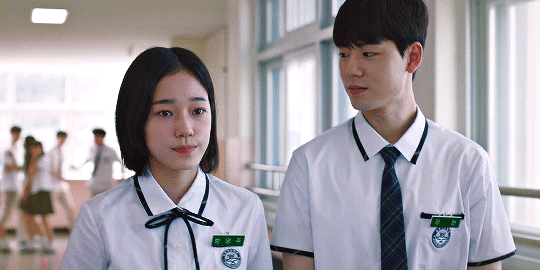
The famous teenage couple from Our Blues is undoubtedly what ensured that we kept watching this drama. Featuring this young couple, the drama explores the themes of abortion, teen pregnancy, and parenthood. In 2019 South Korea decriminalized abortion, making the decision effective only last year, and the plot brilliantly showed the longings, doubts, and fears of the female protagonist because existing the possibility does not always mean existing ease of access. In counterpoint, we have a young father present at all times, completely respectful and attentive to his partner (and her decisions!); and a beautiful, but not idealized, approach to the teenage couple.
Despite such difficult and complicated themes, our couple owned the lightest and most beautiful scenes in the drama, which probably stems from the innocence of youth, which faces problems with hope and, above all, love.
In Gwon and Ho Sik
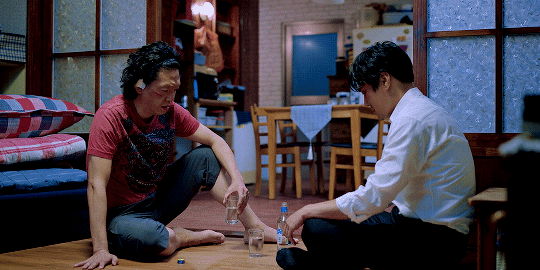
Before they were the solo parents of Hyeon and Yeong Ju, the Romeo and Juliet of Jeju, or two merchants who hate each other, they were friends who grew up together through the streets of Pureung, but were irreconcilably separated; until life found a way to bring them back together. And our hearts were broken and remade during episode 08 of Our Blues, when we had the opportunity to see who these two men are through all the layers of resentment, hurt, and longing. In Gwon was once a gangster, and although he has changed his life after some traumatic events and for the sake of his son seeing him with enough pride and no shame, he maintains his explosive temperament while making a decent living selling sundaes. Ho Sik is an ice salesman who does his utmost to fulfill the dreams of his daughter, the best student in her class, building his ideals on the basis of his and her dreams, but he breaks down when he finds out that his daughter is pregnant because he must face the reality that says nothing will be as they both planned.
And the drama deals amazingly with how these two men deal with their own vulnerabilities and fears, delivering an "enemies to lovers" that is completely believable and well executed in all its motivations. From the way they "come together" to deal with their teenage children becoming fathers to the building of a new family forged by blood, strengthened by memories that now no longer hurt, these two give a lesson in sensitivity! The scene in which we revisit the moment when everything changed between them, showing how In Gwon made a lot of money from crime and Ho Sik lost all his money in gambling and betting, gives us the warning that because of what we say without thinking, we can lose very special people. It is about a journey of friendship full of nuances and depth that, before anything else, teaches and touches us.
Chun Hui and Eun Gi
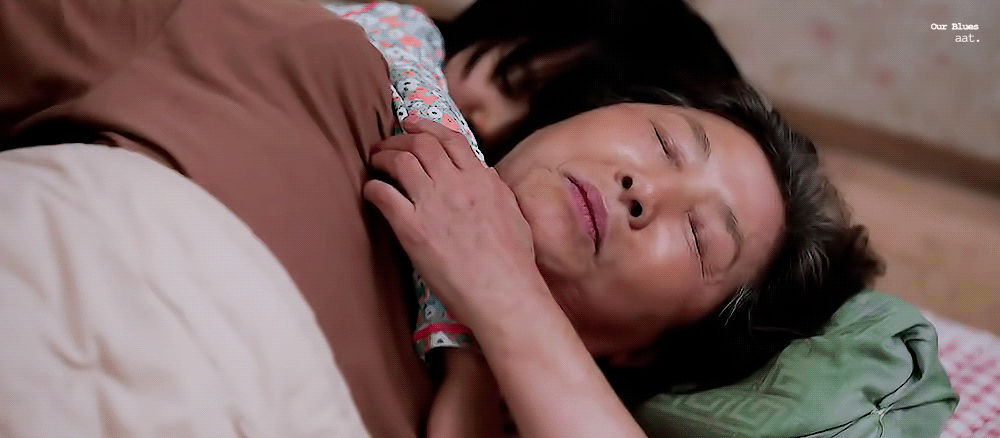
One of the most beautiful and touching scenes in the 20 episodes of Our Blues originates from this duo: a haenyeo already speaking as if she were at the end of her life, and her only granddaughter, a child at the beginning of her own. The generational conflicts between the two are hilarious and relaxing to watch, while we suffer along with the little girl, so young, hiding such an important and painful secret from her grandmother (and only adult around).
With the two of them we learn that respecting cultural differences and each other's feelings; whatever the age, is necessary for the relationship to be healthy, kind, and admirable. Eun Gi masterfully showed us the importance of listening to and lovingly caring for a child, who despite her size, also has worries and sufferings. Chun Hui showed us how the scars of life leave deep scars, but we learned that seeing our days with "child's eyes" gives us the possibility to build a future that becomes the present. With them we also understand that having hope and believing that everything is possible, even praying to 100 moons, is necessary for us to live in peace.
Miran and Eun Hui
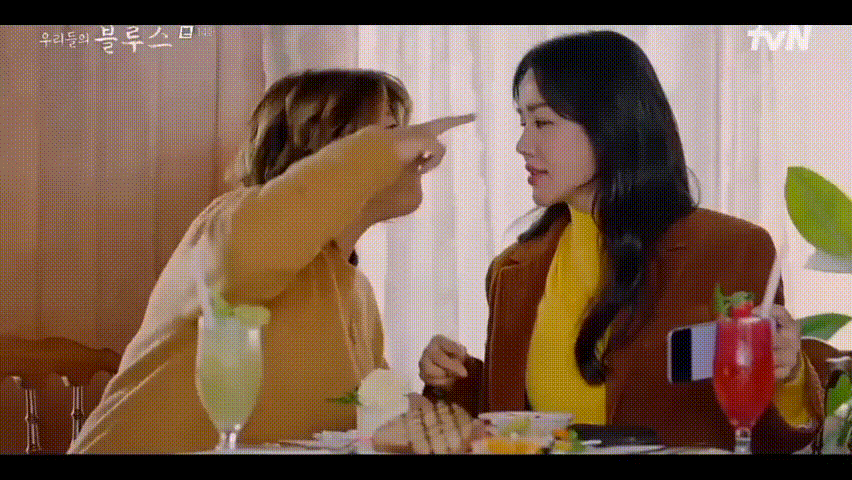
Our unforgettable landlady of Korea's scariest apartment building is back in Our Blues, completely different. As Eun Hui, she now brings to life that expression single yes, alone never. Perhaps being the link between all the characters in the story and the axis through which the whole plot orbits, as a common point in the lives of everyone there, Eun Hui is that person who knows how to help, but does not know how to be helped by putting herself on a lower rung than her friends. Miran, on the other hand, is that character that in every scene you do not know whether to love or hate, whether to envy or pity. She is the representation of that universal phrase: no one knows what is going on in someone else's life. And between flashbacks and enumerating ex-husbands on the fingers of our hands, we get to see the layers of this character; of the wiles of life in bringing these two women together from a very young age until now.
The decades-long friendship of the two also brings to the drama and the viewer a reflection on how we treat our friends and why we have these long-standing bonds even with so many differences. They make us think of Sandy's Leap in the part where she says, "Decipher me and translate me. In my shadows, you see the light. You know everything, and it's okay, what I really am, and only attached to you do I feel at liberty." It's about freedom to be who you are. About loyalty, especially to yourself.
Yeong Ok and Jeong Jun
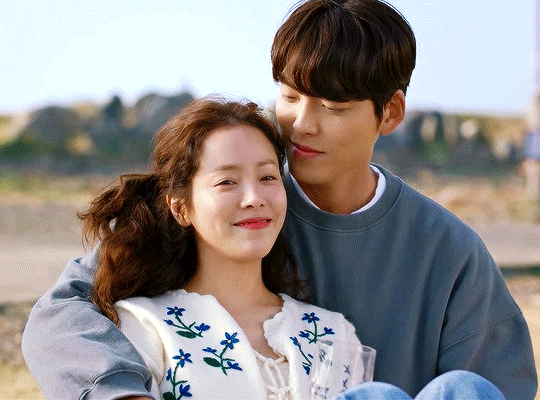
If the previous pair represented friendship with different personalities, this one represents the love relationship with opposites (who always attract?). Yeong Ok is the mysterious woman for the Pureung community. Nobody knows for sure where she comes from and what is true about her. Coming to the island from the mainland, she messes with everyone's head with vague answers about her life. While Jeong Jun, the quiet captain who blossoms as the plot progresses, is the quarrelsome and beloved by all wherever he goes. His charm with this mysterious haenyeo is very enjoyable to watch.
The shyness and the direct dialogues, the doubts that arise about this possible love and, most of all, the insistence without going beyond the limits to break the defense shield of the person for whom they have feelings, make this couple irresistible. Their relationship is like a game of tug-of-war that, at the same time that it shows the difficulties in staying together, captivates the viewer in a beautifully developed emotional escalation!
Yeong Ok and Yeong Hui

It is the first time we see a person with Down Syndrome in a drama, as it is also the first time we see the subject being portrayed the way it should be: naturally. The relationship of the two twin sisters is something very beautiful and important to follow, mainly because there is not the layer of idealization or infantilized purity that is almost always given to the PCD. Our Blues goes deep into Yeong Ok's uglier feelings, so to speak, such as rejection and family guilt, without seeming forced or cartoonish. To make it better, it presents a completely independent Yeong Hui within her limitations, who presents herself and is seen as a woman, not a child in an adult's body, who has a voice and is aware of her desires and wants. Episode 15 is a tight hug for us because it talks about the loneliness of these two sisters without using a single word. We see. We are invited to feel.
Dong Suk and Seon A
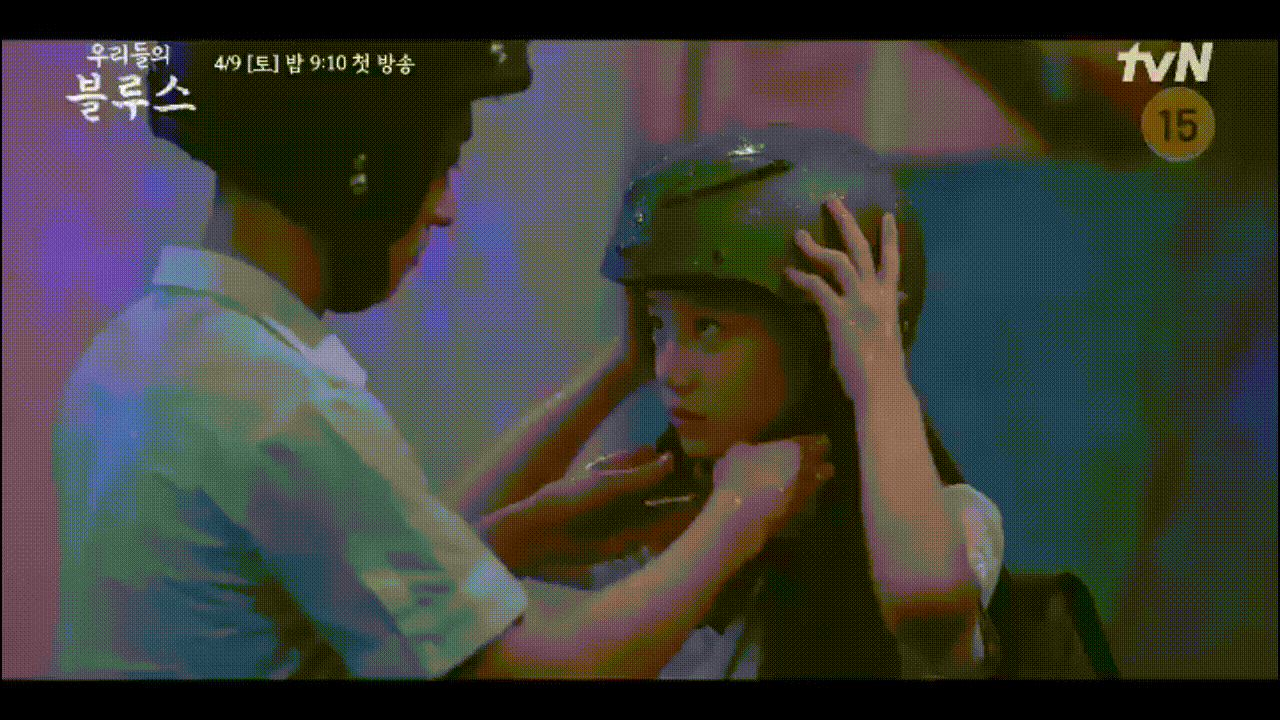
Dong Suk, the unluckiest man on Jeju, is the type that almost no one would look twice at, but is so intriguing because the potential for going wrong is all in his favor that it is impossible to look away: you are curious to know when and especially how everything started to go wrong in his life. Born and raised in Pureung, he sells a plethora of items in his truck, and after meeting Seon A, his first love when he lived in Seoul, he sees fate put her back on his path again; this time under the blue Jeju sea. The couple reconnects, listens to each other, helps each other, and shares their traumas in such a way that the past begins to outline healing; so that the present heralds a path for the future for the two of them.
Quite a difficult path for Seon A, who gives a brilliant portrayal of depression in adult women who need to deal with themselves, work in and out of the home, marriage and children while dealing with a divorce and parental custody proceeding. The weight she carried was palpable, the representation of feelings, making use of the resource of water and light, incredible! Loaded with synesthesia and symbolism, Seon A's scenes are full of meaning, especially since her relationship with Dong Suk needed time to consolidate, to strengthen; to blossom. Together, they see life close chapters and start new ones, as they bridge distances and pains and add learning and exchange.
Dong Suk and Ok Dong
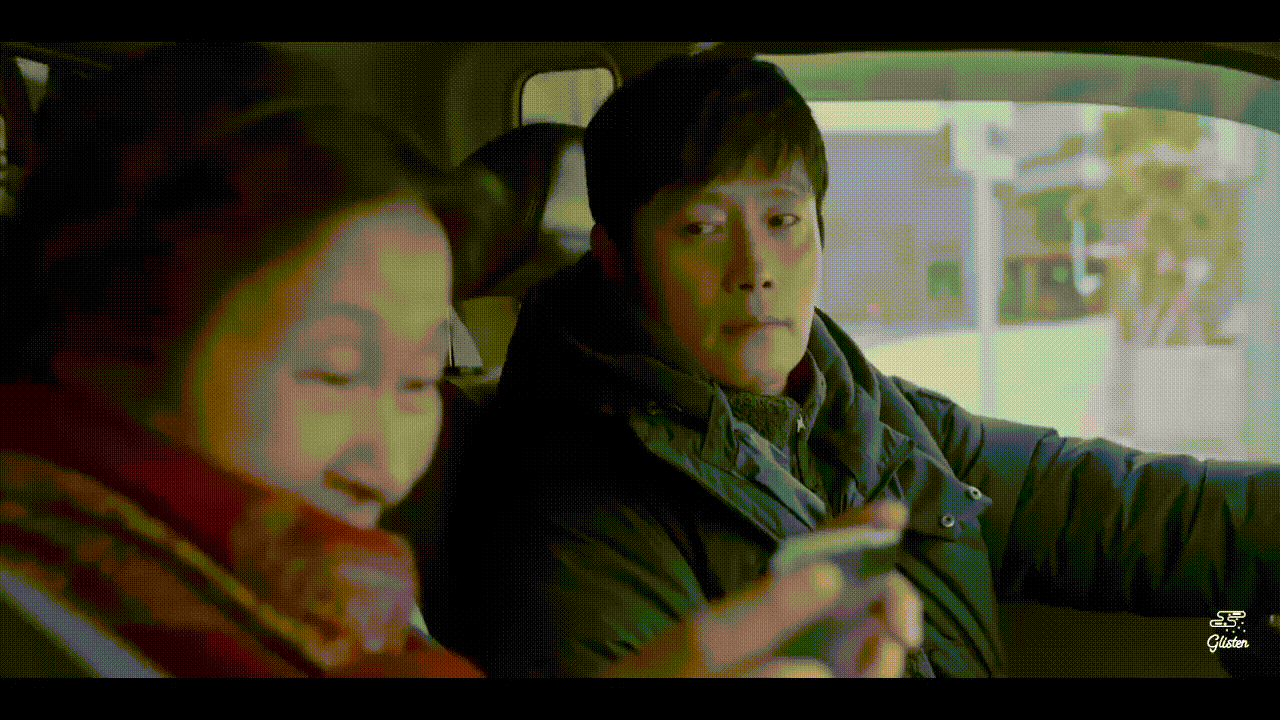
Following this mother and son relationship was like riding a roller coaster. Even though they lived in the same city, they were separated by emotional walls too hard for Ok Dong to climb, too thick for Dong Suk to break. Between initially unexplained facts and a thrilling sequence in the final triad of episodes of Our Blues, the walls structured by the unspoken words and built up by the pain and heartbreak of all that could have been, begin to crumble: we understand each other's reasons for being, we see both versions of the tale; we realize that, in the end, it was a single story written by four hands. And most of all, that there is no side to choose because the trajectory of this mother with her son, although it was shown like this at the beginning, was not a fight, but a waltz.
Pureung's community
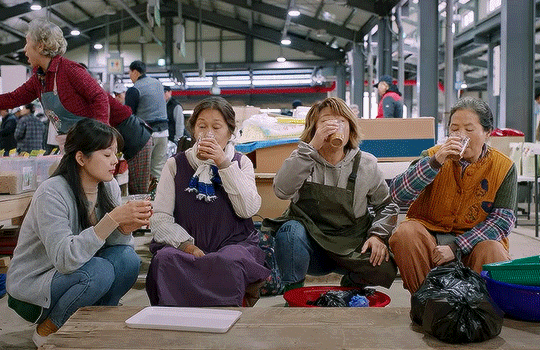
To stitch together multiple complete and complex narratives and use different perspectives on the same fact is extremely difficult, but it seems easy when watching Our Blues. Every detail is carefully crafted and every story executed with preciousness, allowing the viewer to dive into the sometimes calm and sometimes turbulent seas of the inhabitants of Pureung Village. No episode seems detached from the other, just as no character lives alone because, on that island, "no man is an island," as Thomas Morus would say.
The particular universe of each one is what gives rhythm to the stories, all connected between past and present, just like the inhabitants of Jeju and their sense of community, companionship, and collective responsibility: they feel and live as one big family. And because they are united by the invisible threads of coexistence and friendship, they give the implicit certainty of being there for each other whether to chat while sharing the daily chores or to join 100 moons in the sky: while life becomes too noisy or too tumultuous, the Jeju sea warns them in cyclical movements that there are days of tsunami, but also of low tide. For them, the important thing is to sail. And they sail. United.
Our Blues touched on necessary themes such as depression, bankruptcy, solo parenting, teenage pregnancy, male victims of domestic violence, disabilities, youth, aging, loves, fears, and loss. As the title itself illustrates, there is a lot of sadness and vulnerability, but there is also a lot of hope and smiles; because as long as there is life, there are second chances. The drama taught how it is possible to tell beautiful stories without neglecting the evolution and the trajectory of its characters, giving completeness and protagonism to the whole cast because, by connecting the stories, the people were prioritized. Thus, throughout 20 episodes, Our Blues made us reflect in its intergenerational and multifaceted narrative, showing us life as it is: painful, beautiful; lived.

Translated with www.DeepL.com/Translator







